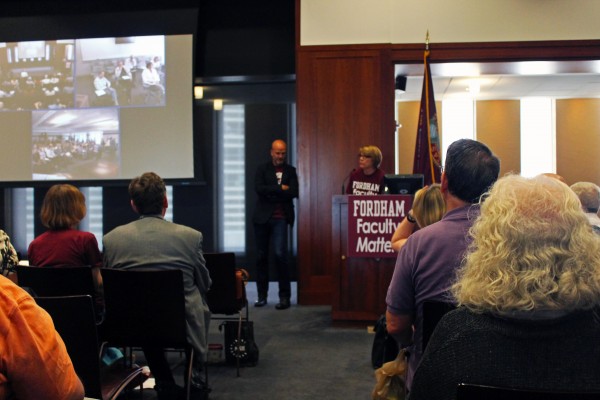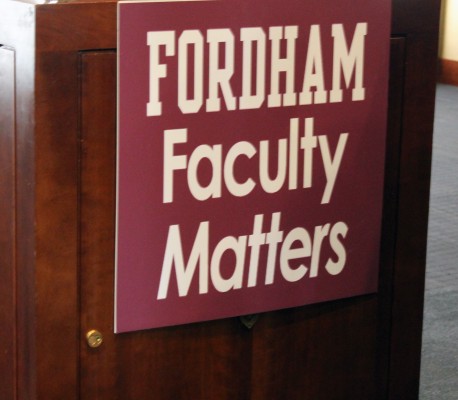Faculty Raise Concerns Over Healthcare Negotiations
September 11, 2014

Faculty across all three campuses of Fordham University came together on Wednesday, Sept. 10 to be briefed on the current negotiations between the faculty representatives and administration in regards to health care benefits, salary increases and more.
“From the very beginning, we made it quite clear that any type of change in health care would require massive outreach to the community to educate them about what potential changes would be in effect,” Andrew Clark, Ph.D, associate professor of french and comparative literature, vice president of the Faculty Senate and chair of the faculty salary and benefit committee, said.
The faculty-wide meeting, sponsored by the Faculty Senate and live-streamed throughout the three campuses, was “called because the unilateral decision of the administration to choose UnitedHealthcare without the approval of the Faculty Senate, has created even more pandemonium,” Clark said.
Clark also asserts that the administration has been negotiating in bad faith. The Administration finds these allegations “dismaying,” Robert Howe, Senior Director of Communications, said, “The entire process was initiated by an urgent request from the Faculty Senate to the Board of Trustees requesting the University put health insurance up for competitive bidding.” The University hired a consulting firm and also paid for the Faculty Senate to hire its own.
Members of an ad hoc committee of the Faculty Senate has been in negotiations with the Fordham Administration since spring 2013, after John Lordan, Senior Vice President and CFO, proposed the elimination of Cigna, the University’s current health care plan, as well as increasing faculty cost-sharing to 15 percent across the board.
According to an informational handout given at the forum, over the summer of 2013, administrators and faculty discussed request for proposal process, in which an institution or company interested in a service, will solicit potential providers to submit business proposal through a bidding process. The first request for proposal was issued in September 2013, with the results presented to the Faculty Senate in November of the same year. “The formation of ad hoc faculty committee on health insurance” took place in December of 2013, according to the same document.
Up until this point, “the process has taken a long time and the communication of requested documents has been particularly slow,” according to Faculty Senate Meeting Minutes #398, taken on Feb. 21, 2014.
According to Clark, the ad hoc committee began to meet regularly with the Administration in March 2014, when a second request for proposals was issued. “We worked rather collaboratively and effectively in our weekly Tuesday meetings throughout the Spring,” Clark said. “We were able to speak rationally, we were able to share ideas, we were able to make corrections on things that seemed to be not right.”
Negotiations began to “derail” in June 2014, when the Administration reversed its earlier position regarding salary and benefits package, Clark said. “All of a sudden the Administration’s’ position was that they had to decide health care first.” According to Faculty Senate Meeting Minutes #399, taken on March 28, 2014, the ad hoc committee reported to the other members of the faculty senate that “Mr. Lordan reminded the committee that any decisions regarding health care would be considered as part of the [Salary and Benefits] package.”
“That was the beginning of what then became a series of radically bad faith negotiation tactics,” Clark said.
On July 15, Fordham “announced their unilateral decision to enter into an agreement with UnitedHealthcare without Senate approval,” Associate Professor and President of the Faculty Senate Mary Ann Forgey, Ph.D, said, briefing faculty at the faculty-wide meeting. “As a result of this action, they violated our statutes and showed complete disregard for shared governance process.”
The University Statute that Forgey refers to is 4.08-01, that reads “a faculty salary and benefit plan is determined annually between the Administration of the University and the Faculty Salary & Benefits Committee,” wherein the “committee shall negotiate with the Administration concerning the total amount of faculty salaries and benefits and the allocation thereof.” Any proposals negotiated by the Faculty Salary and Benefits committee is reviewed and approved by the Faculty Senate before “final agreement with the Administration is achieved.”
“We weren’t informed about the decision when it was made, likely two weeks earlier [than July 15] and the Senate certainly did not vote,” Associate Professor of Theology and Faculty Senator Patrick Hornbeck said to the faculty.
The Administration, however, ascribes their actions as a result of the Faculty Senate being unable to reach a decision before a deadline imposed by the Board of Trustees. “All of the participants were aware of the selection timeline ending with the selection of a carrier by June 30, 2014,” Howe said. When the negotiations were unable to come to a consensus at the last meeting on June 30, “the University had to act, choosing UnitedHealthcare as the better value.”
Clark characterizes the negotiations between the ad hoc committee and the Administration as “rather disgraceful, in terms of the types of negotiations that have taken place.” According to Clark, there were multiple times in which the ad hoc committee would have to refer to transcripts of past meetings that they recorded because administration would seem to agree with one stipulation, only to disagree at a following meeting.
Ad hoc meetings with administration began to be recorded at the Faculty Senate recommended, after “discrepancies were found between the minutes recorded by [the Administration and the ad hoc committee,” according to Faculty Senate Meeting Minutes #399 taken on March 28, 2014.
Meanwhile, the Administration characterizes the negotiations as collaborative. “Throughout the process, all sides showed a willingness to compromise wherever possible” to achieve two goals: ensuring Fordham’s health coverage was maintained despite challenges faced by the unrolling of the Affordable Care Act (ACA), and that the University adopt a plan that would protect the University and family members covered under their insurance from a luxury tax imposed by the ACA.

On Sept. 4, the Salary and Benefits Committee voted negatively on the Administration’s proposal, which included a total salary increase of 2.5 percent, faculty paying 9 percent of medical insure in 2015, with the goal of increasing cost-sharing to 15 percent and other items the Administration and Salary & Benefits Committee had come to an agreement on, including retirement, dental and vision plans.
During the faculty-wide meeting, Clark revealed that the difference between the University’s preferred UnitedHealthcare plan and the Cigna plan that faculty prefers is roughly $1.5 million. If faculty were to switch over to UnitedHealthcare, it would generate $2 million in savings. Faculty members argue that those savings should go back towards the faculty, in forms of salary increases or lower contribution levels. “There are some savings from the move to UnitedHealthcare, but those savings are already reflected in the University budget. The Administration is working with the Faculty Senate on salary increases that are likely to be well above budget,” Howe said.
The meeting also provided faculty with a space to pose questions. “What are the priorities of the Administration?” one faculty member asked.
“Look at that building,” Associate Professor of Political Science Bruce Burg said as he pointed to the new Law School and residence hall. “Basketball coaches are making seven figures. The University has money and makes choices.”
Others inquired about the role Rev. Joseph M. McShane, S.J., president of Fordham University had taken throughout negotiations. “What is the role of the President throughout all this?” one faculty member asked. “To hide behind the other administrators,” another faculty member responded from the audience. According to Forgey, McShane was “well aware of the situation.” Faculty commented that McShane’s convocation was coming up the following week, suggesting faculty absence would make a statement.
The meeting ended with a call to action, encouraging faculty to attend Faculty Senate meetings on Sept. 12 and 19, write letters to McShane and Lordan and contribute to the Senate fund for the defense of faculty rights.
According to Clark, the ad hoc committee will be reviewing final UnitedHealthcare documents on Thursday, Sept. 11, with a Faculty Senate vote on Friday, Sept. 12 if the package is deemed acceptable by the Salary and Benefits Committee.
With open enrollment to UnitedHealthcare beginning on Oct. 10, “everything is on the table right now,” Clark said. “There was a unique opportunity in the spring that showed we could work together, it seemed to be respectful, and that got destroyed in the summer.”
The Administration and the Board of Trustees believe that an agreement will be reached that is in the best interest of all the members of the Fordham community, according to Howe.
“There’s not much patience anymore. The loss of that community, the loss of that potential of working together is destructive,” Clark said.











